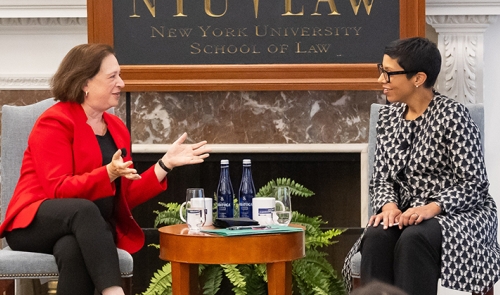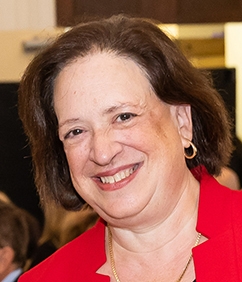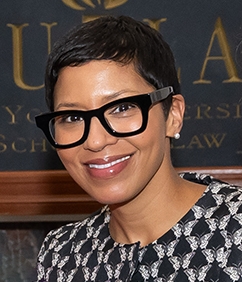Elena Kagan considers ethics reform, abortion, and gender

On September 9, US Supreme Court Associate Justice Elena Kagan weighed in on some of the most urgent issues facing the Court in the inaugural Sidney Shainwald Public Interest Lecture at NYU Law, hosted by the Birnbaum Women’s Leadership Center. Kagan’s public conversation with Melissa Murray, Frederick I. and Grace Stokes Professor of Law, drew attention from major news organizations as well as the audience of NYU Law community members. Along with some witty asides, the justice delivered judicious but relatively candid remarks about abortion rights and Supreme Court ethics reform.
During her visit to the Law School, Kagan also spoke to a full house of students in Tishman Auditorium, recalling how meaningful she had found her experience as a clerk for Justice Thurgood Marshall. Those recollections segued into a discussion of women at the Court and women’s rights more broadly when Kagan alluded to her clerkship again during her conversation with Murray, noting that she was one of fewer than 10 female clerks in the 1987-88 term. Today’s clerks have largely reached gender parity, she added. Murray observed that nearly half of the current justices are women.
“Is parity just merely symbolic at a moment where it feels like we’re really regressing on women’s rights, even as there’s actual parity at the Court?” Murray asked.
“I’ve always thought that the reason to want representation and to want parity has very little to do with actual outcomes,” Kagan said. “I mean, it turns out that women think a wide variety of things.” But this relative parity, she suggested, does convey a message “about the role of women in this society and about how they can participate at the highest levels in courts of law and in other forums as well.”
When Murray asked about the dramatic decrease in the number of cases heard by the Court in recent years, Kagan mentioned a few potential theories, such as the rise of legal research tools that allow lower courts to look at other courts’ precedents more easily and thus avoid circuit splits. She added that the justices are working just as hard despite taking on fewer cases because the number of emergency petitions being accepted—known collectively as the shadow docket—increased substantially beginning in the Trump administration. A number of lower courts granted sweeping nationwide injunctions against some of the administration’s policies, prompting emergency petitions to the Court. That trend has continued with challenges to Biden administration policies.
Kagan said she understood both sides. On one hand, she said, an appeal via the typical route could take years to make its way to the Supreme Court, leaving a policy in limbo. “On the other hand,” Kagan said of the shadow docket, “I don’t think we do our best work in this way.”
Watch the full video of the conversation:
Briefing for emergency petitions is more limited than that for regular cases, she explained. Further, she said, the justices are deliberating with no or very limited lower court opinions. In the past year or two, Kagan noted, the Court has granted limited argument in such cases to improve its deliberative process.
The discussion also touched on Kagan’s thoughts about the Supreme Court’s much-debated new ethics code, which was created in response to increasing concern about potential conflicts of interest for some justices. In previous public remarks, Kagan had called the ethics code a good one, but said that an enforcement mechanism was needed, such as a committee of federal judges to hear ethics complaints involving the justices. When Murray referred to an activist’s recent comment that Kagan was “somewhat treasonous” for critiquing the absence of an enforcement mechanism, Kagan declined to give her reaction but quipped: “It’s sort of like ‘somewhat pregnant’ or something.”
Toward the end of the conversation, Murray referred to Justice Clarence Thomas’s widely discussed concurrence in Dobbs v. Jackson Women's Health Organization, the case that overturned Roe v. Wade. The Dobbs opinion held that there was no constitutional right to abortion because it did not exist when the Fourteenth Amendment—the basis of Roe—was ratified. Thomas argued in his concurrence that the Dobbs reasoning should be employed in reconsidering other Supreme Court precedents that granted the right to contraception, made same-sex marriage the law of the land, and overturned laws criminalizing private sexual activity.
Although the majority opinion disavowed Thomas’s argument, Kagan suggested that his position did, in fact, follow logically from their ruling. The historical reality that there was no right to an abortion in 1868 constitutes “the entirety of the majority’s reasoning [in Dobbs],” Kagan said. “Then you could say the same thing for contraception. Then you can say the same thing for interracial marriage. Then you can say the same thing for gay marriage. You can say the same thing for a lot of things.”
Posted September 20, 2024



